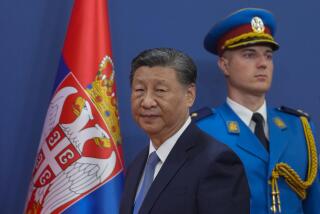China largely ignores Obama’s trade criticism
President Obama fired a shot across China’s bow during his State of the Union address Tueday, pledging to lure offshore jobs back to the U.S. and target unfair Chinese trade practices with a special enforcement unit.
The response in China, however, was muted at best -- perhaps drowned out by the barrage of fireworks across the country as it continues to celebrate the weeklong Spring Festival national holiday.
“What’s worth noting is that Obama mentioned China five times in his State of the Union speech,” wrote the Beijing-based Legal Evening News, one of the few Chinese newspapers to acknowledge the mention of China in the president’s address. “Every time it was about the economy. He repeatedly attributed the struggle of the U.S. economy to China’s rapid growth.”
China’s Ministry of Foreign Affairs was closed and did not respond to a request for comment Wednesday. But judging by past reactions, Beijing will likely dismiss the president’s statements as posturing for political advantage.
Shi Yinhong, professor of international relations at Remin University in Beijing, said Sino-American relations will be tested in the coming months. China’s leaders are irked that Washington is reasserting its influence in Asia, and worried that their economy is slowing too fast. Combine that with the U.S. presidential election and the transition to new top leadership in Beijing later this year and the situation could grow testy.
“The relationship could become more tense than it has in a long time,” Shi said. “Domestic politics always comes first.”
A quick gauge of where relations are headed comes next month when Chinese Vice President Xi Jinping visits the U.S. The man slated to become the next president of China will likely face long-held complaints about an undervalued Chinese currency, closed consumer markets and the problems of counterfeiting and piracy.
Though the two sides have sparred through the World Trade Organization, Beijing and Washington have so far averted a full-blown trade war. The U.S., after all, is China’s second-largest export market, and China is the largest foreign buyer of U.S. treasuries.
Patrick Chovanec, an associate professor at Tsinghua University’s School of Economics in Beijing, said China’s leaders will likely stay quiet despite the heightened rhetoric against the country’s trade policies.
“I don’t think the Chinese have any advantage to gain by interjecting in this debate,” Chovanec said. “They probably want to lie low and draw as little attention as possible.”
More to Read
Inside the business of entertainment
The Wide Shot brings you news, analysis and insights on everything from streaming wars to production — and what it all means for the future.
You may occasionally receive promotional content from the Los Angeles Times.











